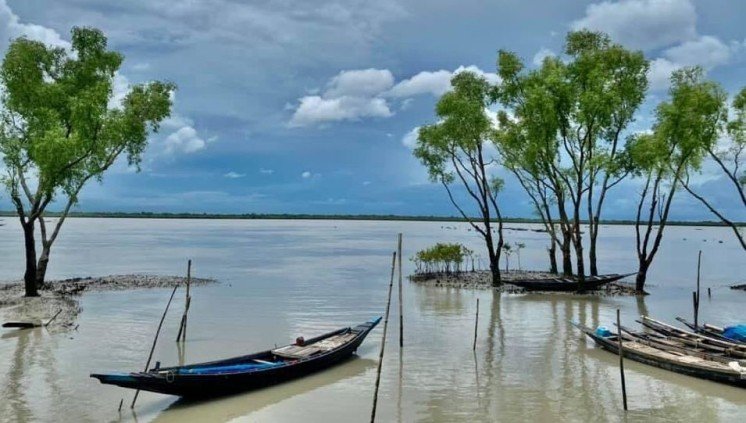Building Resilience to Climate Change in Coastal Bangladesh
Gabura, Satkhira district, one of the most climate affected areas in Bangladesh. Photo credit: Mahfuza Mala
—First published on Linked on October 13th, 2022—
Written by Mahfuza Mala, Sundarban Coalition Member Support Liaison
Community activist Morsheda Begum is no stranger to the challenges of climate change: at 37 years old she has already lived through four super cyclones. Experiencing firsthand how these disasters were increasing in frequency and intensity, Morsheda founded the grassroots organization Mohila O Shishu Shongho in 2005 to build community resilience in the Koyra Upazila of Khulna District, in southern Bangladesh.
As president of the organization, she believes resilience building can only happen alongside gender justice, as climate change permeates every aspect of the lives of the women of Koyra. When disaster strikes, they are more likely to experience violence, injury and death and they can no longer cook or provide for their families, which has deep repercussions on the wellbeing of their children.
In 2005, Morsheda and the other women of her community mobilized to protect women and address the issues the community was facing. They worked together to map out who was more vulnerable to disasters, which parts of the community were the most at risk and devised their action plans accordingly. When Cyclone Sidr struck in 2007 and Cyclone Aila in 2009, Mohila O Shishu Shongho led the humanitarian response.
“I labored day and night”, says Morsheda. “We visited the community even after the disaster to examine humanitarian needs while also providing psychological assistance. Stepping outside the house after the disaster was not easy for us. But we had to because we care for the people of our locality.”
In addition to responding directly, Morsheda and her allies collectively raise awareness and implement programs to prevent sexual harassment and violence against women and girls, advocating to eradicate harmful gendered norms and practices that hinder women’s empowerment and violate their human rights.
Morsheda and the women she works with say that their journey wasn’t easy. “At first, everyone in the community laughed at us. They didn’t think we could do much. We were just women. But time has gone on and things have changed. They do not laugh anymore. They listen.”
Morsheda says that the work that she and the women have done hasn’t gone unnoticed. “Now, the local government calls us when they are making decisions about their budget for disaster risk reduction. We advise them on what is best for the community, and what is the most effective way of spending money.”
This International Day for Disaster Risk Reduction, the Bangladesh government has chosen to honor Morsheda Begum and a few others with the "Best Volunteer of the Year Award (2022) – a national award in recognition of her work in the coastal areas as a volunteer member of the Cyclone Preparedness Programme (CPP).
She stresses the critical role of women in DRR and emergency response. “Involving women in the response process made a significant difference,” said Morsheda. “The entire process was more decentralized therefore progress was much faster than usual; the emergency shelter design was more inclusive and considered accessible to all members of the family. Additionally, during community consultation, we put special emphasis on children’s nutrition in a post-disaster situation.”
“We are doing all that we can to make things better, and we have made some substantial changes. But every time we think that things are getting better, something else happens”. “Hence, we cannot do it alone, and we shouldn’t have to. We want our government – with the support of other governments, to support us and listen to us about what we need.”
In 2022, community leaders including Morsheda have come together to form the Sundarban Coalition which aspires to foster locally led resilient and humanitarian action in coastal areas. This coalition has formed in partnership with the Local Coalition Accelerator, an initiative of The Share Trust and the Warande Advisory Centre, and in collaboration with Start Network and Margaret A. Cargill Philanthropies.
The coalition is multi-sectoral, and members will leverage each other’s strengths to design a holistic program at scale that is designed, led, and implemented by local actors who are in tune with their communities' needs, offering a common entry point for donors to invest in localized systems change interventions. Morsheda says, “the Sundarban Coalition provided us with the platform to strengthen our capacity to take local-level actions and to initiate the strongest influencing initiatives with national and international actors.”
The Local Coalition Accelerator aims to support local and national organizations to lead in the design and execution of large-scale systems change, and directly access the significant bilateral and multilateral financing that is currently channeled almost exclusively to and through UN or INGO vehicles. The LCA aims to build the infrastructure to shift greater funding and power to local actors, while also changing donor processes and systems to be more equipped to accompany and complement community driven initiatives.

